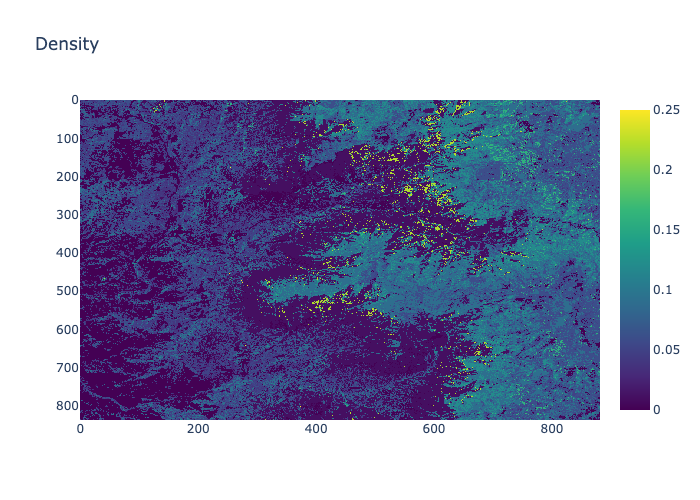|
|
--- |
|
|
dataset_info: |
|
|
features: |
|
|
- name: name |
|
|
dtype: string |
|
|
- name: canopy |
|
|
sequence: int8 |
|
|
- name: density |
|
|
sequence: float32 |
|
|
- name: slope |
|
|
sequence: int8 |
|
|
- name: shape |
|
|
sequence: int16 |
|
|
length: 2 |
|
|
splits: |
|
|
- name: train |
|
|
num_bytes: 27490487 |
|
|
num_examples: 6 |
|
|
download_size: 7175919 |
|
|
dataset_size: 27490487 |
|
|
configs: |
|
|
- config_name: default |
|
|
data_files: |
|
|
- split: train |
|
|
path: data/train-* |
|
|
license: cc |
|
|
task_categories: |
|
|
- feature-extraction |
|
|
tags: |
|
|
- climate |
|
|
- geology |
|
|
size_categories: |
|
|
- n<1K |
|
|
--- |
|
|
|
|
|
# WildfireSimMaps |
|
|
|
|
|
## Description |
|
|
|
|
|
This is a dataset containing real-world map data for wildfire simulations. |
|
|
The data is in the form of 2D maps with the following features: |
|
|
|
|
|
- `name`: The name of the map data. |
|
|
- `shape`: The shape of the area, in pixels. |
|
|
- `canopy`: The canopy cover in the area, in percentage. |
|
|
- `density`: The density of the area, in percentage. |
|
|
- `slope`: The slope of the area, in degrees. |
|
|
|
|
|
## Quick Start |
|
|
|
|
|
Install the package using pip: |
|
|
|
|
|
```bash |
|
|
pip install datasets |
|
|
``` |
|
|
|
|
|
Then you can use the dataset as follows with **NumPy**: |
|
|
|
|
|
```python |
|
|
import numpy as np |
|
|
from datasets import load_dataset |
|
|
|
|
|
# Load the dataset |
|
|
ds = load_dataset("xiazeyu/WildfireSimMaps", split="train") |
|
|
ds = ds.with_format("numpy") |
|
|
|
|
|
def preprocess_function(examples): |
|
|
# Reshape arrays based on the 'shape' field |
|
|
examples['density'] = [d.reshape(sh) for d, sh in zip(examples['density'], examples['shape'])] |
|
|
examples['slope'] = [s.reshape(sh) for s, sh in zip(examples['slope'], examples['shape'])] |
|
|
examples['canopy'] = [c.reshape(sh) for c, sh in zip(examples['canopy'], examples['shape'])] |
|
|
|
|
|
return examples |
|
|
|
|
|
ds = ds.map(preprocess_function, batched=True, batch_size=None) # Adjust batch_size as needed |
|
|
|
|
|
print(ds[0]) |
|
|
``` |
|
|
|
|
|
To use the dataset with **PyTorch**, you can use the following code: |
|
|
|
|
|
```python |
|
|
import torch |
|
|
from datasets import load_dataset |
|
|
|
|
|
device = torch.device("cuda" if torch.cuda.is_available() else "cpu") |
|
|
|
|
|
# Load the dataset |
|
|
ds = load_dataset("xiazeyu/WildfireSimMaps", split="train") |
|
|
ds = ds.with_format("torch", device=device) |
|
|
|
|
|
def preprocess_function(examples): |
|
|
# Reshape arrays based on the 'shape' field |
|
|
examples['density'] = [d.reshape(sh.tolist()) for d, sh in zip(examples['density'], examples['shape'])] |
|
|
examples['slope'] = [s.reshape(sh.tolist()) for s, sh in zip(examples['slope'], examples['shape'])] |
|
|
examples['canopy'] = [c.reshape(sh.tolist()) for c, sh in zip(examples['canopy'], examples['shape'])] |
|
|
|
|
|
return examples |
|
|
|
|
|
ds = ds.map(preprocess_function, batched=True, batch_size=None) # Adjust batch_size as needed |
|
|
|
|
|
print(ds[0]) |
|
|
``` |
|
|
|
|
|
## Next Steps |
|
|
|
|
|
In order to make practical use of this dataset, you may perform the following tasks: |
|
|
|
|
|
- scale or normalize the data to fit your model's requirements |
|
|
- reshape the data to fit your model's input shape |
|
|
- stack the data into a single tensor if needed |
|
|
- perform data augmentation if needed |
|
|
- split the data into training, validation, and test sets |
|
|
|
|
|
In general, you can use the dataset as you would use any other dataset in your pipeline. |
|
|
|
|
|
And the most important thing is to have fun and learn from the data! |
|
|
|
|
|
## Visualization |
|
|
|
|
|
Density |
|
|
|
|
|
 |
|
|
|
|
|
Canopy |
|
|
|
|
|
 |
|
|
|
|
|
Slope |
|
|
|
|
|
 |
|
|
|
|
|
## License |
|
|
|
|
|
The dataset is licensed under the CC BY-NC 4.0 License. |
|
|
|
|
|
## Contact |
|
|
|
|
|
- Zeyu Xia - [email protected] |
|
|
- Sibo Cheng - [email protected] |
|
|
|